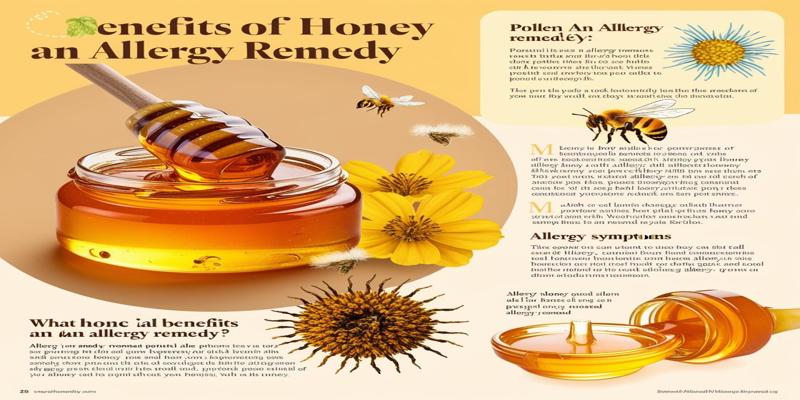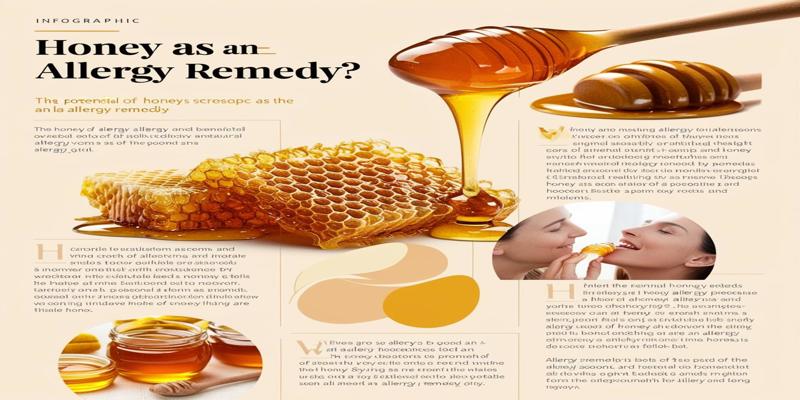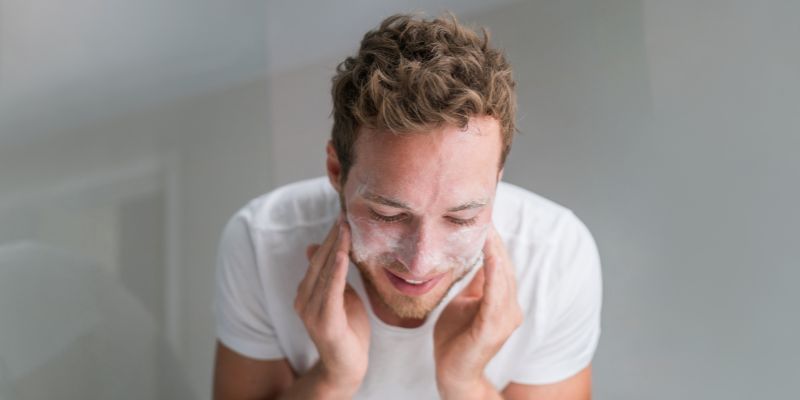Advertisement
As allergy season approaches, you may search for natural remedies to alleviate your symptoms. One popular folk remedy that's gained attention is using local honey to combat seasonal allergies. But does this sweet solution work, or is it just a sticky myth?

Seasonal allergies, or hay fever, are usually caused by tree, grass, and weed pollen. These tiny particles cause symptoms by overreacting some people's immune system, such as sneezing, itchy eyes, and a runny nose. Healthline states common symptoms include a sore throat, coughing, and headaches.
One principle behind using honey as an allergy remedy is based on the idea behind allergy shots: that a gradual desensitization might occur, making the body less reactive to certain allergenslocal pollen, in this case. Another myth buster is that most bees collect their nectar from flowers, which are not the types responsible for seasonal allergies.
Results regarding honey for the treatment of allergies have been mixed. Some studies indicate that honey has anti-inflammatory and antioxidant effects that could be beneficial in treating allergies. For example, honey inhibits mast cell degranulation and reduces IgE levels, critical events in allergic reactions. Yet, other studies have shown no benefit whatsoever. The disparity in findings, along with the small sample size in several of these studies, are a few reasons one cannot say that honey is effective as an allergy remedy.
Based on a similar immunotherapy notion, honey used as an allergy remedy generally relies on the fact that, through ingestion of honey-source, locally produced honey containing small amounts of pollen, over time, a person may get desensitized to specific allergens, much as with the use of allergy shots, thereby lessening the immune system's reaction to pollen grains.
Scientific evidence for its effectiveness in offering allergy relief is mixed, with some studies showing promise while others show no significant benefit. One key challenge is that the pollen in honey often differs from the types that typically cause seasonal allergies.
Despite these conflicting studies, honey may provide some benefits through various mechanisms. Preclinical experiments showed that honey suppresses mast cell degranulation, depresses IgE levels, and reduces airway inflammation. Thus, honey might have anti-allergic potential, but more research is still needed to determine how this would affect human allergies.
A study recently found that large doses of honey, in addition to antihistamines, significantly improved symptoms of allergic rhinitis compared to a placebo. Larger clinical trials should be performed to confirm these findings and establish optimal dosing strategies. While studies are still ongoing, honey remains one of the most interesting natural remedies; how well it works can vary from person to person.

Raw local honey is often touted as a superior allergy remedy. The theory is that a minimal amount of local honey pollen will acclimate the body to those allergens. Unfortunately, there isn't much scientific data to support this argument. While some claim relief, this may be easily explained by a placebo effect rather than a legitimate medical treatment.
Manuka honey, especially of higher grades, may hold promise for improving symptoms of allergic conditions. Its higher antibacterial and antioxidant capabilities could contribute to reduced inflammation of the airways and modulation of immune responses to allergens. Being a monofloral honey, it is also less likely to contain a variety of pollens that would act as allergens.
Other honey, like tualang and gleam honey, contain higher amounts of these compounds, including flavonoids and polyphenols. Several in vitro studies have demonstrated the anti-allergic activity of such components. Further research is necessary to see whether they may have a role in alleviating allergies.
Scientific evidence has remained mixed, but several studies have found that eating local honey can ease allergies. "In one study in which a regime of honey and pollen was followed, the allergy symptoms were reduced by 60% compared to patients who did not attempt this method. This is because trace amounts of pollen present in honey may desensitize your immune system over time against local allergens.
To take advantage of the possible allergy relief that honey may provide, try the following techniques, which include:
While some find it relieves symptoms, the success of honey as a treatment against allergies depends on different individuals. Several recent studies also came up with conflicting results, with some stating that honey may enhance allergic symptoms in specific cases. It is always advisable to consult a doctor before applying honey as part of your allergy management regimen, especially if your allergy is severe or you are on other medication.
While honey is not harmful to most of us, it could be an allergen to people. According to Wyndly, honey allergy affects less than 0.2% of the population, yet it may show severe symptoms such as anaphylaxis. Those suffering from pollen or bee sting allergies are more prone to this allergy. If you are experiencing symptoms like wheezing, dizziness, or nausea after consuming honey, please consult a doctor immediately.
Therefore, it is crucial to note that honey must never be given to infants under 12 months. According to the Mayo Clinic, honey contains spores that can result in infant botulism, a rare form of gastrointestinal disease that affects babies. This applies to all kinds of honey, raw and processed alike.
Caution should be exercised when consuming honey, mainly among diabetics or those who need to monitor their blood sugar levels. According to WebMD, consumption in large quantities may provoke an increase in blood sugar for people with diabetes with type 2 diabetes. It is advisable to consume honey in moderation and consult a doctor if one is apprehensive about its implications for blood sugar.
While honey seems a promising natural elixir that can cure allergies, much scientific evidence is required to establish this. You may find relief by consuming local, raw honey; however, the results may vary. Remember, always consult your healthcare provider before using honey or any alternative treatments, especially in case of severe allergies.
Advertisement

By Georgia Vincent/Dec 28, 2024

By Isabella Moss/Nov 14, 2024

By Maurice Oliver/Nov 14, 2024

By Vicky Louisa/Dec 28, 2024

By Mason Garvey/Mar 16, 2025

By Celia Kreitner/Mar 01, 2025

By Sean William/Mar 01, 2025

By Sean William/Mar 01, 2025

By Jennifer Redmond/Mar 01, 2025

By Celia Shatzman/Dec 06, 2024

By Martina Wlison/Nov 14, 2024

By Pamela Andrew/Mar 17, 2025